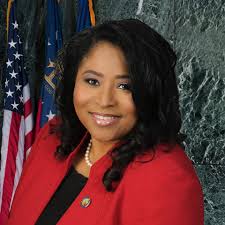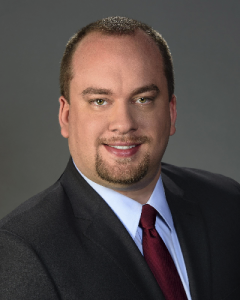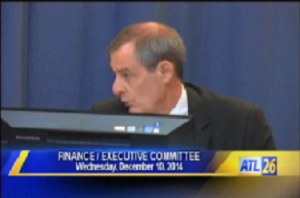Atlanta Seeks to Ordain Videos as Minutes of Official Meetings
 (APN) ATLANTA – After admitting in court documents that several of the official minutes of past Committee Meetings of the Atlanta City Council fail to meet the minimum vote recording requirements of the Georgia Open Meetings Act, on Monday, May 16, 2022, the Council will consider legislation that pretends, but fails, to address the issue.
(APN) ATLANTA – After admitting in court documents that several of the official minutes of past Committee Meetings of the Atlanta City Council fail to meet the minimum vote recording requirements of the Georgia Open Meetings Act, on Monday, May 16, 2022, the Council will consider legislation that pretends, but fails, to address the issue.
Instead of simply amending the minutes to list the movers and seconders, currently-proposed City of Atlanta Ordinance, 22-O-1357, introduced as a personal paper by Councilwoman Andrea Boone (District 10) only creates more problems.
Introduced at the last Full Council Meeting on May 02, 2022, the paper was referred to the Committee on Council, also being held on Monday, May 16, where the paper will be heard.
Councilwoman Boone chairs the Committee on Council.
 Committee Members are Amir Farokhi (District 2), Dustin Hillis (District 9), Antonio Lewis (District 12), Mary Norwood (District 8), Howard Shook (District 7), and Matt Westmoreland (Post 2-at-large).
Committee Members are Amir Farokhi (District 2), Dustin Hillis (District 9), Antonio Lewis (District 12), Mary Norwood (District 8), Howard Shook (District 7), and Matt Westmoreland (Post 2-at-large).
Depending on the Committee’s action, it may be considered again by the Full Council later in the day.
As previously reported by Atlanta Progressive News, the City of Atlanta has openly admitted that the official minutes of five Committee Meetings have failed to list the movers and the seconders of certain votes as required by law.
https://atlantaprogressivenews.com/2022/04/30/atlanta-fails-to-amend-minutes-despite-promise-to-court/
To pretend to address the problem, instead of simply amending the minutes, the City Council’s proposed ordinance would ordain that the videos of all official meetings–past, present and future–are hereby part of the official minutes of all meetings – past, present, and future.
The problems with this are manifold:
 First, the Georgia Open Meetings Act requires written minutes. The draft minutes required by O.C.G.A. 50-14-1(e)(2)(A), that is, “a summary of the subjects acted on and those members present at a meeting of any agency shall be written…”
First, the Georgia Open Meetings Act requires written minutes. The draft minutes required by O.C.G.A. 50-14-1(e)(2)(A), that is, “a summary of the subjects acted on and those members present at a meeting of any agency shall be written…”
There is no reason to believe the Georgia Legislature intended for the minutes to exist in a non-written format when the post-meeting summary is required to be written. After all, if a video was good enough, the law would have allowed for a video post-meeting summary.
Second, the videos may or may not contain the required information by law, such as the names of the movers or the seconders on each vote.
Especially in past committee meetings of the City of Atlanta, the videos often only provide audio (or audio and video) of the persons saying “Motion to approve” or “Second,” without the Chairperson or the video otherwise identifying the person making the motion or seconding.
Therefore, incorporating the video by ordinance does not make the information part of the minutes.
 Third, if a member of the public accesses a PDF file of the minutes on the City’s website, the video files are not attached to the minutes there (or anywhere).
Third, if a member of the public accesses a PDF file of the minutes on the City’s website, the video files are not attached to the minutes there (or anywhere).
https://citycouncil.atlantaga.gov/legislation/city-council-meeting-minutes
Nor is there any way the video file will be attached to the minutes. There is no known way to merge a PDF file with a video file.
So the paper and video files would be cross-incorporated by ordinance, but not actually attached or cross-referenced in any way.
Fourth, the City of Atlanta, by requiring the public to watch videos to access basic vote information, is now making its official minutes inaccessible to deaf or hard of hearing members of the public.
This raises concerns under the Americans with Disabilities Act.
 Fifth, the City of Atlanta is now requiring members of the public to either own computers or DVD players in order to access basic information about the meeting.
Fifth, the City of Atlanta is now requiring members of the public to either own computers or DVD players in order to access basic information about the meeting.
This will make the official meeting minutes especially inaccessible to low-income Atlantans and seniors without computers or DVD players, especially in District 10, southwest Atlanta.
Sixth, requiring members of the public to watch hours-long meetings in order to access basic information that is required by law to be listed in the minutes–that is, in an easy, systematic, accessible format–will make it more difficult for the average citizen to participate in their local government.
Seventh, currently the City of Atlanta charges individuals thirty-five dollars for DVDs of meeting videos.
 This means that members of the public–who will have to somehow know (because of this ordinance) that they have to request the DVD along with the minutes–will now have to pay thirty-five dollars for each meeting minutes they want to access.
This means that members of the public–who will have to somehow know (because of this ordinance) that they have to request the DVD along with the minutes–will now have to pay thirty-five dollars for each meeting minutes they want to access.
Eighth, many past meeting videos of Atlanta’s Full Council Meetings and Committee Meetings are housed at the Atlanta History Center, many on videocassette, and are so fragile that members of the public are warned that if they watch them on a VCR, the cassettes may break during viewing.
APN can report that the Atlanta History Center has been begging the City of Atlanta to digitize its historical meeting videos, but the City has failed to do so.
 Therefore, by incorporating video files that may have literally expired because of their aging physical format, into the official meeting minutes of the same meetings, the City of Atlanta would create a legal right of public access to videos that may no longer exist or be endangered.
Therefore, by incorporating video files that may have literally expired because of their aging physical format, into the official meeting minutes of the same meetings, the City of Atlanta would create a legal right of public access to videos that may no longer exist or be endangered.
This action may create an obligation for the City to pay to digitize all of those videos in order to prevent the non-preservation of the minutes – of what would now be part of the minutes.
Atlanta Progressive News, Inc.’s lawsuit against the City of Atlanta challenging the minutes, Atlanta Progressive News v. City of Atlanta, 2020CV353735, has been pending since last year before Fulton County Superior Court Judge Kelly Lee Ellerbe.
https://www.law.com/dailyreportonline/2022/05/06/why-wont-they-fix-the-minutes-attorney-continues-war-against-atlanta-over-alleged-open-meetings-violations/
(END / Copyright Atlanta Progressive News / 2022)